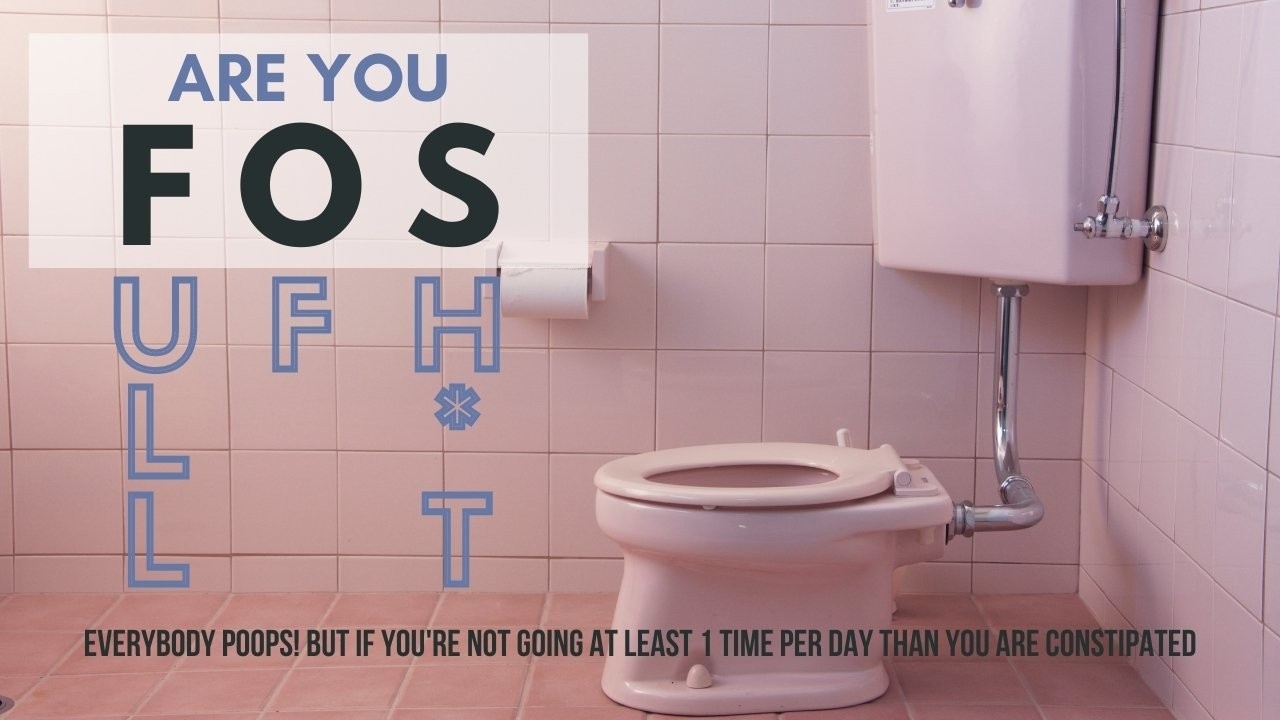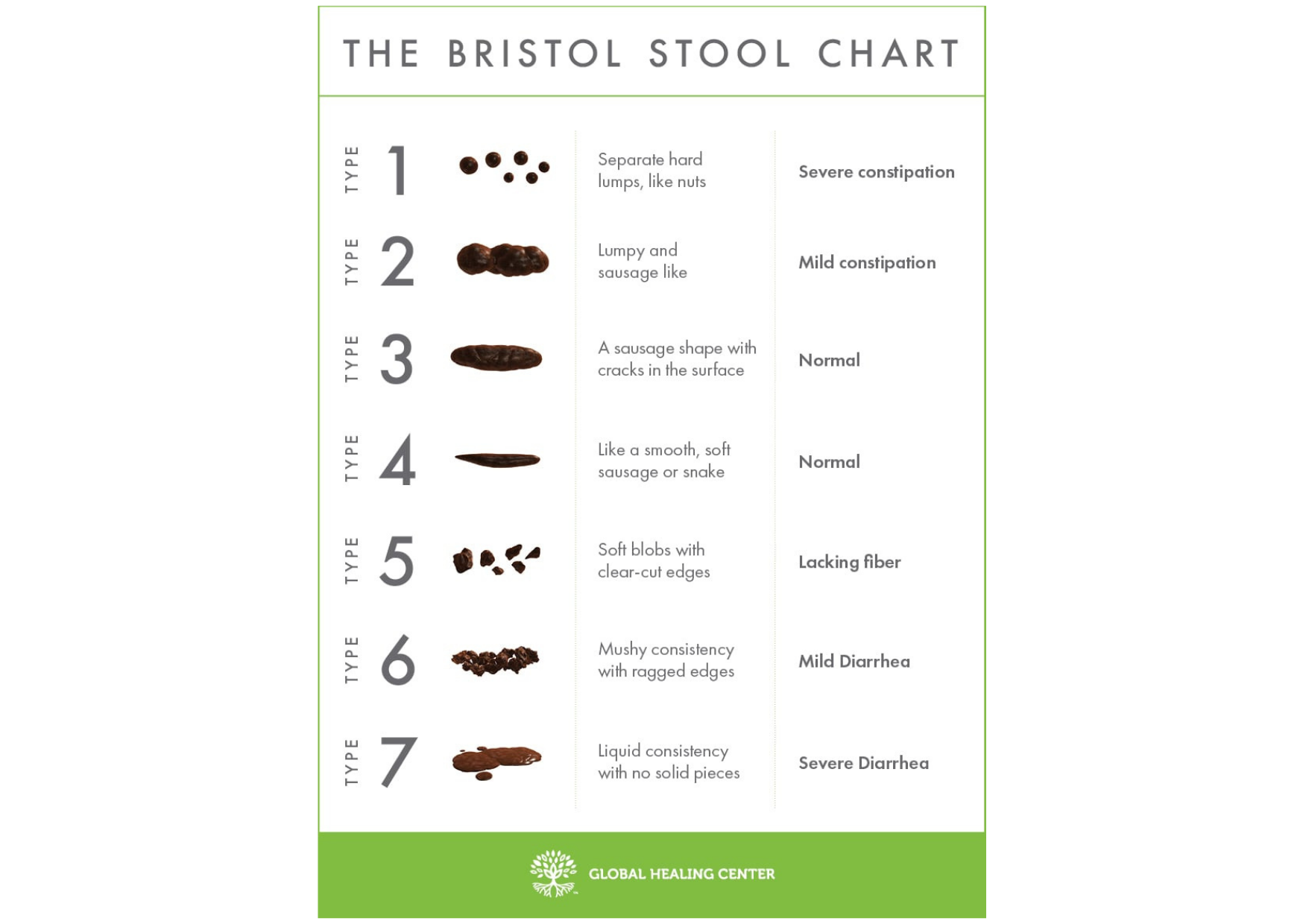
Are You FOS?
Nov 02, 2020Most people think that pooping less than 1 time per day is normal. But not so fast my friends. If you’re not going 2-3 times PER DAY then you are in fact FULL OF SHIT (or FOS as we called it in then the x-ray world).
Is My Poop Normal
So let the poop talk begin. More specifically, let’s talk about the poop that has been sitting in your colon for far too long.
The Rome IV criteria for constipation include having 2 or more of the following:
-
Straining for at least 25% of bowel movements
-
Lumpy or hard stools at least 25% of the time
-
The sensation of incomplete evacuation for at least 25% of bowel movements
-
Feeling obstructed 25% of the time
-
Utilizing manual maneuvers to facilitate a bowel movement at least 25% of the time
-
Fewer than 3 bowel movements per week
-
Having hard stools unless a laxative is used
Your bowel movements should be soft and well-formed. It should resemble the size and texture of a banana. This bristol stool chart can be used as a great visual for your bowel habits.
Why Does Coffee Make Me Poop?
So my question to you is if it wasn’t for your morning coffee, would you tick a few boxes for the symptoms in the Rome IV criteria? Sorry folks, but if you need to drink coffee to have a bowel movement, then you have some issues with constipation.
Any time we put something in our mouth it travels down the esophagus and enters the stomach for further digestion before it enters the small intestine where more digestive enzymes aid digestion for nutrient extraction before moving on to the colon. Part of the digestion process includes the contraction of the bowels and the propulsion of digested foods along the track. It’s not 100% known, but it is believed that warm coffee stimulates those contractions to happen at a much faster rate. It’s also possible that the sugar and/or dairy added to your coffee could not be well tolerated by your body and leaving you scurrying to the bathroom
But I digress, let’s get back to constipation….
What Causes Constipation
There are many culprits that contribute to us having fewer than 2-3 bowel movements per day. Most of those are related to diet and lifestyle. Let’s, for example, look at those that have not been affected by diet and lifestyle yet. Babies and pets are good examples. They eat, they poop. And they do it quite frequently! We, as humans, grow up from those tiny babies where someone is feeding us, get introduced to more foods, and ultimately start choosing our own foods (which probably are not always the most nutrient-dense). Add in there a little stress, a sedentary lifestyle, not drinking enough water, taking medications, and BOOM, we are no longer pooping 2-3 times per day.
Oh, and can we talk real quick about how we have made pooping in public an uncomfortable situation. Listen up y’all! Everybody poops! And we should feel comfortable doing our deed in a public bathroom. “Holding” your poop and not going when your body gets the urge can also lead to constipation. Yep! The longer the stool sits in your colon waiting for you to give it the OK to leave your body, the more your body reabsorbs the water that is in the stool leaving you with a poop that looks like a 1 or 2 on the bristol stool chart when you finally do go. If “doing your business” in public has you feeling a little embarrassed because the smell could clear a room, then you could also be looking at other GI issues.
The Gut Bacteria and Fermentation
Think of your colon of the compost pile. By the time the digested food gets to your colon, most of the nutrients have been absorbed. The bacteria in the colon begin the fermentation process on fiber which creates short-chain fatty acids. Short-chain fatty acids not only provide energy for your colon cells but also contribute to the immune system, controls appetite, can have anti-cancer properties, regulate the integrity of your intestinal lining, and can have neuroprotective properties. Indigestible food, wastes, bacteria, toxins, dead mucosal cells, and hormones compose fecal material. The longer that waste sits in your colon, the longer it ferments and the smellier it can get. If Tuesday’s spicy fish tacos aren’t exiting your body until Saturday, you bet it’s gonna stink!
Transit time should be 12-24 hours. If it is less than 12 hours, you may not be absorbing all of the nutrients in your food. If it is continually greater than 24 hours you are at risk for colon disease and increased toxin burden.
Other Constipation Causes
Constipation is not a black-and-white situation and often I’m doing a little detective work to figure out what could be contributing lack of elimination. I’m all for testing, not guessing. With testing, we are able to have concrete data to steer us in the right direction.
Here are some things to consider as contributing factors.
-
Low fiber, highly processed diet
-
Medications - opiates, antidepressants, anticonvulsants, calcium channel blockers, antacids
-
Ignoring urges to defecate
-
Gut dysbiosis/microbiome imbalances - SIBO, candida, parasites, etc
-
Magnesium deficiency
-
Underactive thyroid
-
Overuse of laxatives
-
Inadequate water consumption
Tips for Constipation Relief
My clients always laugh at me when I tell them that I’m going to help get their bowels regulated so they are AT LEAST going 1 time per day, ideally 2! If we hit 3 times, BONUS! But after a few months of working together, they are happy to report that they are no longer constipated and frequently eliminate with ease. Here are some easy things you can implement now to keep your bowels happy.
-
Increase fiber intake - 24g of fiber minimum per day!
-
Hydrate - half of your weight in ounces of water every single day (coffee, soda, alcohol, etc may be liquid but do not count as water!)
-
Incorporate exercise or movement into your day
-
Listen to urges to defecate
-
Probiotics - support that healthy microbiome!
-
Supplement with magnesium
-
Digestive enzymes
-
Explore food sensitivities - this is a big hidden trigger for constipation!
-
Evaluate medications
-
Supplement with vitamin C
-
Evaluate your thyroid levels with a comprehensive panel.
The information available on this website is for general health information only and is not intended to be a substitute for professional medical advice, diagnosis or treatment. You should not rely exclusively on information provided on the Website for your health needs. You can read more about our disclaimer here.
Are you overwhelmed by all of the conflicting information regarding health, hormones, nutrition, and weight management?
Join me once a month for a FREE "Ask Me Anything" live Zoom sesh! I'll answer all the questions you've been spending so much time searching the internet for.









